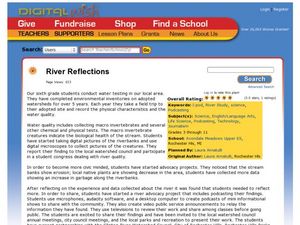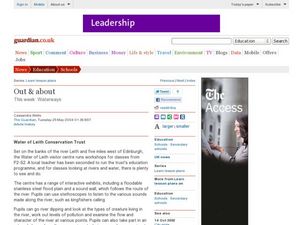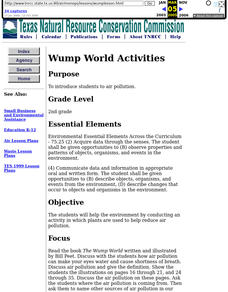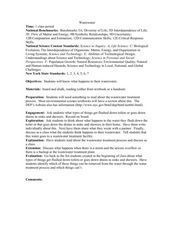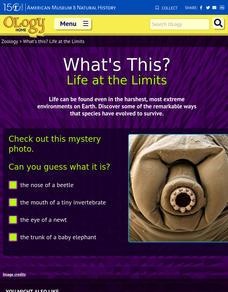Curated OER
Crab Crossword Puzzle
In this crab worksheet, learners read ten clues that pertain to sea crabs. Students match these to vocabulary words in a box. Learners fit their answers in a crossword puzzle.
Curated OER
River Reflections
Sixth graders create podcasts and video public service announcements. In this environmental advocacy lesson plan, 6th graders study the local watershed and become advocates for their local environment. In the process, they create...
Curated OER
Out & About: Waterways
Students visit science museums. In this hands-on science lesson plan, students visit the Leith Conservation Trust, Catalyst, and the River and Rowing Museum in person or online to study Britain's waterways.
Curated OER
Ecosystems
Third graders identify and define an Ecosystem and the basic needs of all animals. They collect pond water in a pickle jar. They observe the organisms that are in the jar to keep an ongoing record of the creatures and their population.
Curated OER
Pond Exploration
Students take a hands-on approach to explore the world beneath the water in this activity. They examine the creatures they catch to study about the adaptations these animals have that allow them to survive in this harsh environment. They...
Curated OER
Life's Big Questions: Where Did Life Come From?
Students explore the life forms that live in the hot springs of Yellowstone. They examine how microscopic creatures can survive in these extreme conditions. Students perform experiments to observe growth samples and demonstrate how a...
Curated OER
Wetlands Project
Young scholars discover how wetlands filter out contaminants before they can reach other bodies of water. In groups, they design and build a model of a stormwater wetland. They test the water quality and inform their classmates about...
Curated OER
Where Do You Fit In?
Students study habitats and then draw a picture of their own habitat which includes the location of food, water, and shelter, and the concept of space. then they cut their habitat in half and discuss how this would affect their lives.
Curated OER
Wump World
Second graders read ead the book The Wump World written and illustrated by Bill Peet. Discuss with the students how air pollution can make your eyes water and cause shortness of breath. Students discuss air pollution and give the...
Curated OER
Bell Live! The Great Lakes: A Superior Adventure
Young scholars participate in a virtual field trip to Lake Superior. In groups, they perform experiments in which test the level of toxins and bacteria in the water. They also watch video segments life in the lake and discuss their...
Curated OER
How Sweat Glands Cool Your Body
Learners use water and rubbing alcohol to explain how sweat cools mammals' bodies. They write their findings in a journal. After a lecture/demo, students perform a simple experiment that demonstrates this phenomenae.
Curated OER
Ocean Pollution
Students study their role in eliminating ocean pollution and helping keep the oceans clean. In this environmental issues activity, students define pollution and brainstorm examples of ocean pollution. Students define biodegradable and...
Curated OER
Make Way for Wild Migrants
Students discuss the threats facing migratory species and track the seasonal journeys of wildlife in real space and in cyberspace. Once they have gathered information from several sources, they create a portfolio to share with others...
Curated OER
Environment: Mock Trial
Students role-play a trial regarding the taking of family property for a new water purification plant. Among the roles are the judge, attorneys, witnesses, plaintiff, mayor, and jury members. Once both sides present their case, the...
Curated OER
Oddball Out: Animals
In this problem solving worksheet, learners analyze a row of pictures
of various animals to determine which creature is different from
the others pictured.
Curated OER
Create a Habitat for an Animal
In this marine life worksheet, students label the ocean animal and each part of its habitat. Students then draw one of the habitats including the animals and plants that live there.
Curated OER
Wastewater
Students discuss what happens to their wastewater. They read about the wastewater treatment process. Students are asked what types of things get flushed down toilets or goes down drains in sinks and showers. They are taught what happens...
Curated OER
Animals A to Z: Flamingo
In this editing sentences worksheet, students read and edit six sentences about flamingos to find ten errors in capitalization, punctuation, spelling and/or grammar. Students correct each error.
Curated OER
Dinosaurs 1: Where Are the Dinosaurs?
Students explore dinosaurs and their extinction. In this dinosaur lesson, students view dinosaur websites and videos to gain an understanding of the world long ago. Discussion questions follow. Students create a paper mache dinosaur egg.
Curated OER
Sustainability
Here is an in-depth, and incredibly thorough lesson plan on sustainable agricultural practices; specifically, regarding the growth of coffee. After completing and discussing a worksheet called "Thinking About Tomorrow," groups of...
American Museum of Natural History
Make Your Own Mythic Mask or Puppet
No need to wait until Halloween to create a mask. Young anthropologists get involved in the centuries-old tradition of mask and puppet making with the help of an engaging resource that shows them how to craft their own masks or puppets.
Curated OER
Microfishing
Learners use a simple method to collect living microorganisms from natural and/or artificial environments and develop skills in microscopy, observation, drawing, speculation, hypothesizing, oral presentation, and raising questions.
NOAA
Tides
Low tides, high tides, spring tides, neap tides, diurnal tides, semidiurnal tides, mixed tides ... just how many types of tides are there? The 10th installment of a 23-part NOAA Enrichment in Marine sciences and Oceanography (NEMO)...
American Museum of Natural History
What's This? Life at the Limits
There are some amazing ways species evolve to survive. From large ears to sneezing salt, learners read about these interesting adaptations in an interactive lesson. Great to supplement an in-class lesson, it also works well as a remote...



